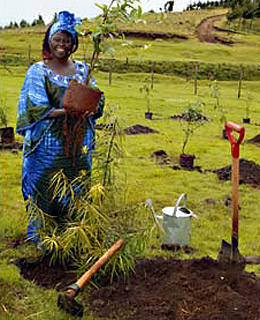
It isn't easy being green in the developing world. Concerned with finding jobs or the next meal, many people don't have time to think about the environment. Wangari Maathai's greatest achievement has been to show her fellow Kenyans that the health of their forests and rivers and fields matters—for both Africa's future and the people's immediate well-being. Maathai began her crusade in 1977 when she founded the Green Belt Movement. Her first victory was to stop Kenya's ruling party from building an office tower on part of a Nairobi city park. It was the first of many run-ins with the oppressive government of Daniel arap Moi, which had her arrested, imprisoned and even beaten up by hired thugs. Yet Maathai and her followers, most of them poor women, stuck to their task and have planted more than 30 million trees to prevent soil erosion and provide firewood for cooking.
The first woman in East or Central Africa to earn a Ph.D., Maathai was elected to parliament in 2002 and last year became the first environmental campaigner — and first African woman — to win the Nobel Peace Prize, for her "contribution to sustainable development, democracy and peace." Despite her controversial views on aids — she has said the virus is a deliberately created biological agent — her message of peace through ecology continues to inspire.
From the Archive
Her Women's Army Defies An Iron Regime: Wangari Maathai, Kenyan heroine for the planet